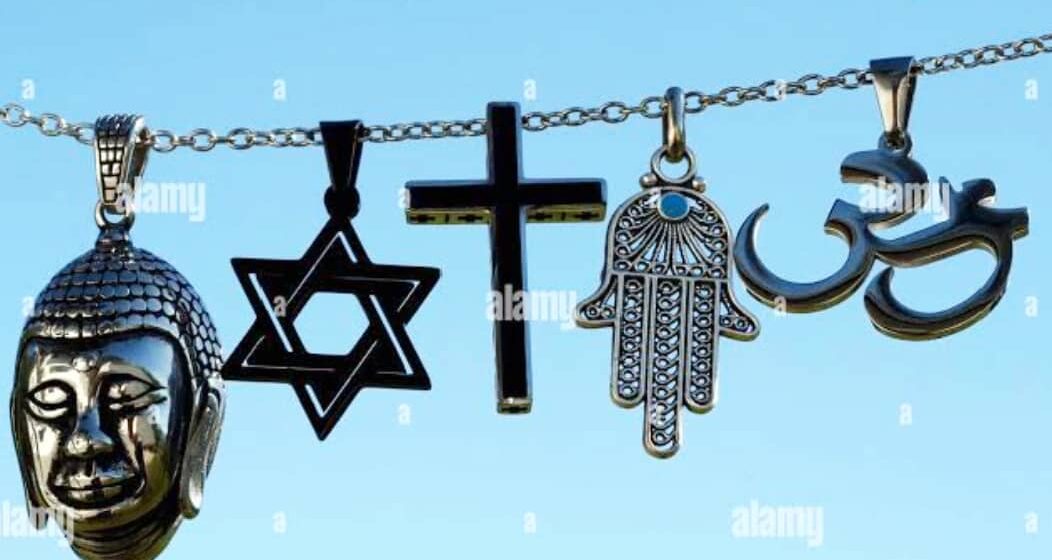By Kevin Okunzuwa
The Nigeria constitution guarantees freedom of worship and forbids the federal and state governments from adopting a state religion, prohibits religious discrimination, and provides for individuals’ freedom to choose, practice, propagate, or change their religion.
What is religion? The Oxford Dictionary defines religion as the belief in and worship of a superhuman power or powers, especially a God or gods.
It says it can also be seen as “ideas about the relationship between science and religion”
Better still, a particular system of faith and worship, a pursuit or interest followed with great devotion.
It is a fact that all religions of the world practically preach righteousness. They preach life after death, in which it is clearly stated that whatever a man sows, that he must reap.
Righteousness is the state of being lawful and morally good. With this, every religion believes that the righteous will inherit the sweeter part of life after death.
Looking through the various religions of the world, one will see the different views on what one stands to gain for being righteous or the punishments that await the unrighteous.
If these were so and true, what then are the reasons for the religious crises that have left thousands citizens dead and properties worth billions of Naira destroyed across states of the federation.
There is no disputing the fact therefore that the problem of religious violence casts a serious doubt to the stability order of the country as the country has recorded very bizarre experiences in the domain of religious violence .
Recent statistics show that since 2000, 62,000 Christians in Nigeria had been murdered in genocide perpetrated by Islamist jihadist groups including Boko Haram, Islamic State West Africa Province (ISWAP), and Fulani militias. The International Committee for Nigeria refers to this genocide as the “Silent Slaughter.”
It reported that in June 2022, more than 50 parishioners at St. Francis Xavier Church in Owo were massacred. “The Nigerian government blamed the massacre on ISWAP, while local eyewitnesses attributed the slaughter to Fulani militias.”
An NGO, Aid to the Church in Need report, said that in 2022, four Catholic priests were murdered in Nigeria, while 23 priests and one seminarian were kidnapped and held in captivity.
In April 2023, the International Society for Civil Liberties and Rule of Law (Intersociety) reported that 18,000 Christian churches and 2,200 Christian schools had been deliberately set on fire, while 34,000 moderate Muslims were also murdered by Islamist jihadists.
Yet, adherents of these religions believe in the same one God; just maybe with different names and different religious ideologies and inclinations.
Poised to finding lasting solution to this incessant clashes and crises, the National Human Rights Commission recently convened a grassroot sensitisation programme for religious leaders from Edo, Osun and Ebonyi respectively.
The one-day event held in Benin City, the Edo State Capital.
In addressing the challenge,the religious leaders spoke on Freedom of Religion and Belief (FORB) in Nigeria.
It had The Kukah Center, Nasrul-lahi-l-Fathiu Society (NASFAT) and King Abdullah ibn Abdulaziz International Centre for Inter-Religious Dialogue as funding partners.
After exhaustive interaction sessions, the religious leaders unanimously identified illiteracy as majorly responsible for the several avoidable religious crises.
Speaking during a panel session, Gabriel Odom, of the Agape Foundation, Ebonyi, said that illiteracy was a significant factor responsible for religious intolerance.
Odom stated that many Nigerians lacked deep understanding of region which had led to misconceptions and conflicts.
He further said that many Nigerians were only religiously inclined by identification or nomenclature, and not by practice.
“Many have taken to needless unhealthy rivalry. Also, economic hardship is fuelling religious intolerance.
“Poverty and lack of opportunities can drive people to seek solace in extremist ideologies.
“Political leaders have found a way to use religion as a tool to manipulate the people to maintain their status.
“So, Nigerians have become more religious than godly. They use religion to divide the people so that their insincerity will not be seen,” he said.
The clergyman said that education and awareness programmes would bridge the knowledge gap and foster mutual respect among diverse religious groups.
Alhaji Al-Ameen Alao, an Islamic Scholar, said that although it was good to promote religious tolerance, it should not lead to religious compromise.
Alao stated that respect for different beliefs should not attempt to dilute the core tenets of any religion.
He said that religious leaders should encourage dialogue and coexistence among people of different faith.
“Political manipulation exacerbates religious intolerance. Politicians sometimes exploit religious sentiments to deepen divisions and gain power.
“Transparent governance and policies that promote inclusivity can mitigate these tensions and foster a more united society,” he said.
Earlier, the Project Coordinator, FORB, Hajia Halimat Oyedele, said that the project was aimed at strengthening religious harmony and coexistence by addressing the existing structural limitations.
She said that the project was also aimed at advocating policy change, and to promote social cohesion through existing laws.
“To prevent possible future violations, the project will also focus on spreading a culture of respect through targeted awareness campaign on interreligious dialogue.
“This will increase the level of tolerance and promote peaceful coexistence among communities,” he said.
The Keynote Speaker, Mr Nurudeen Asonigie, said that religious intolerance was a product of ignorance and fear, adding,”education, dialogue, and empathy are essential”
Among the clerics in attendance were Dr Adesoye Mustapha, NASFAT South-South Coordinator, Chief Imam of Benin, Alhaji Abdulfatai Enabulele, and Humphrey Iriabe, Director of Evangelism, Christian Association of Nigeria, Edo branch.
It is hoped that the recommendations will be escalated to the grassroots, especially in worship centres and other recognised media channels to comprehensively address the worrisome and destructive religious intolerance among religious adherents in Nigeria.








Leave a Reply